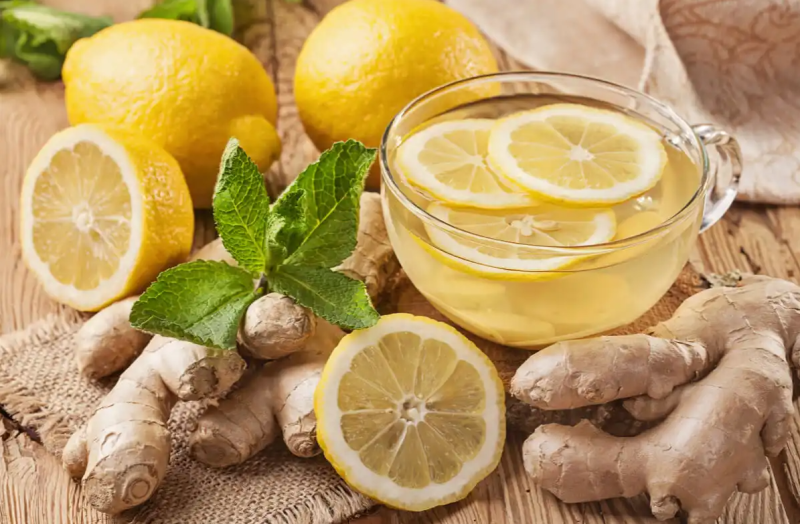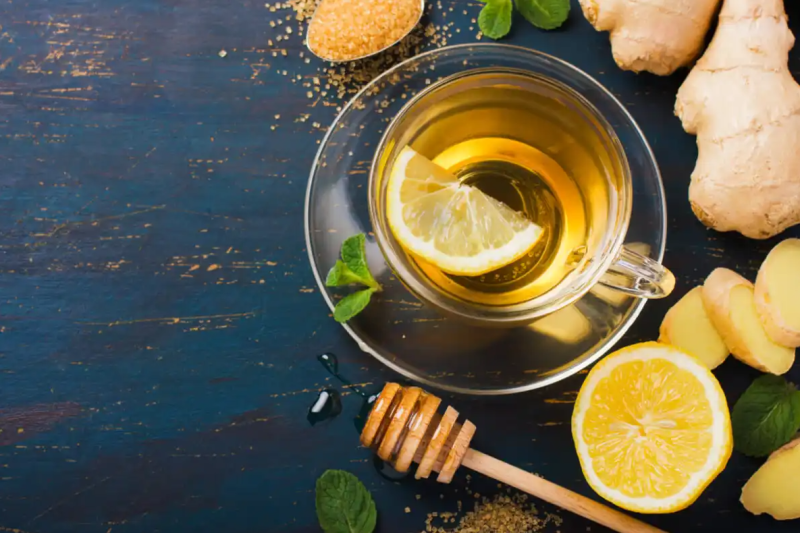 For all those who enjoy herbal tea as soon as they get up or mid-afternoon, the infusion of Ginger with lemon can be a healthy option to include occasionally. It is a drink with a delicious flavor and a spicy touch that, in addition, does not contain caffeine or other stimulant compounds.
Thanks to its ingredients, it can also positively affect the body. Although it is convenient to be cautious and not take it as a curative remedy, below we will tell you more details, and we will teach you how to prepare it simply.
For all those who enjoy herbal tea as soon as they get up or mid-afternoon, the infusion of Ginger with lemon can be a healthy option to include occasionally. It is a drink with a delicious flavor and a spicy touch that, in addition, does not contain caffeine or other stimulant compounds.
Thanks to its ingredients, it can also positively affect the body. Although it is convenient to be cautious and not take it as a curative remedy, below we will tell you more details, and we will teach you how to prepare it simply.
Contents
Ginger and lemon are two ingredients with long medicinal use
Ginger and lemon are two common ingredients in the kitchens of many homes. Both are known for their culinary uses but are also part of many home remedies. Lemon is the fruit of the lemon tree, a tree native to China, where it has been cultivated for more than 2,500 years. Over the centuries, it has spread throughout the Mediterranean basin and the American continent. It is a very versatile fruit when it comes to cooking; since it combines well with many preparations. In addition, it serves as a dressing for all kinds of infusions, adding extra flavor and a touch of acidity. For its part, Ginger is one of the most popular spices in the world. Coming from Central and Southeast Asia, as the International Federation of Aromatherapists points out, it has been used for centuries in the folk medicine of these regions. They also mention it as an important ingredient for health. Not only does it provide nutritional compounds, but it also contains interesting phytochemicals and polyphenols that can have some positive actions on the body.Seven Benefits and Properties of Ginger and lemon infusion
As a consequence of the nutritional composition of both foods, their intake can provide some positive effects on the body. However, it must be considered that to evaluate them; many studies have been conducted with animals. Likewise, in some cases, the listed properties derive from using extracts or some of their parts (skin, leaves, seeds, etc.). With these observations, some benefits and properties for health can be assumed, but the specific effect of this infusion in the long term lacks scientific support.1. Provides antioxidants
As the Spanish Nutrition Foundation (FEN) points out, the most outstanding nutritional characteristic of lemon is the presence of vitamin C. Ascorbic acid (or vitamin C) is one of the compounds that helps protect the body from the harmful effect of free radicals. This is suggested by the United States National Institute of Health (NIH) data. These compounds are generated naturally; however, as the authors of this Oxidative Medicine and Cellular Longevity journal article point out, they can cause cell and tissue damage when in excess. Consequently, the oxidative stress they cause is at the beginning of some non-communicable pathologies. This is the case of cardiovascular diseases, some types of cancer, or premature aging.2. Improves iron absorption
According to a study developed at the National University of Tumbes, vitamin C improves the absorption of iron from foods of vegetable origin. Ascorbic acid also plays a very important role in this process.3. Supports immune function
Another of the actions of vitamin C in the body is to support the activity of the cells of the immune system. The author’s Carr and Maggini point out this for Nutrients magazine. In this sense, on the one hand, it is necessary to maintain an adequate and prolonged response to the presence of pathogens. In addition, it also protects tissues from possible excessive damage. The most recent evidence from Frontiers published in Nutrition magazine supports this property. After research with mice, its authors suggest that daily intake of this infusion activates the immune system.
The most recent evidence from Frontiers published in Nutrition magazine supports this property. After research with mice, its authors suggest that daily intake of this infusion activates the immune system.
4. Promotes the action of the digestive system
This is one of the best-known actions derived from ginger root. Among the many possible effects, it effectively improves nausea and vomiting caused by pregnancy and chemotherapy. This is suggested by the authors of a review of scientific articles published in 2019. Likewise, it is pointed out that it improves stomach emptying and has an anti-inflammatory effect. However, more studies are needed to verify that Ginger is valid in conditions such as non-alcoholic fatty liver, irritable bowel syndrome, or gastroenteritis.5. Protects the cardiovascular system
As stated by a study in the journal Nutrition conducted with 4,628 people, daily consumption of Ginger can have positive effects when it comes to preventing cardiovascular risk. Specifically, it has preventive properties against arterial hypertension and coronary diseases. Furthermore, as the authors Chin and Mustafa point out, a part of this effect is due to its antioxidant action. As we have seen, this is fundamental in preventing problems related to oxidative stress. For their part, the flavonoids present in lemon can improve blood lipid levels, blood vessel function, blood pressure, and fat metabolism. This is why the data published in Oxidative Medicine and Cellular Longevity point to a possible protective action against atherosclerosis and cardiovascular risk. However, the authors point out the need to provide more evidence.6. May Increase Heat Production And Satiety
Studies conducted at several New York universities with men affected by obesity suggest that taking Ginger has a thermogenic effect. This means it can increase body temperature and favor certain metabolic reactions. Likewise, a greater feeling of satiety and reduced hunger are also observed. However, it must be considered that these results have been obtained only with powdered Ginger and that they have not been tested in people without obesity or in women. About this topic, there is a review of more recent studies. Its authors conclude that, with the current data, it is possible to point out that the intake of Ginger improves parameters such as body weight and waist-to-hip ratio.7. Helps the respiratory system
Drinking a hot drink in case of congestion or cold is common for many people. Not only is it comforting, but some ingredients may relieve symptoms. As noted in an article in the Jundishapur Journal of Natural Pharmaceutical Products, Ginger softens and provides moisture to the respiratory tract. In this way, it can improve coughs, colds, and inflammation of the mucous membranes.Infusion of Ginger with lemon: how to prepare it?
One of the best ways to combine the benefits of lemon and Ginger is by preparing an infusion. This drink is very popular for obtaining all the properties of plants, herbs, flowers, and fruits. In addition, its preparation is very simple.Ingredients
- One piece of ginger root, about 2 centimeters, without skin.
- One cup of water (200-250 milliliters).
- The juice of half a lemon.
- Honey (to taste).

Preparation
- Cut the Ginger into slices. If you prefer, you can also grate it.
- Next, heat water in a small pot and add the Ginger. Let boil for 4 or 5 minutes.
- After this time, turn off the heat and let it rest for another 3 or 4 minutes. Then, strain the contents into a cup, add the lemon juice, and it’s ready to drink.
Possible adverse effects of the infusion of Ginger with lemon
For the general population, both ingredients are considered safe. This is so as long as they are taken in moderate amounts (not greater than those considered food) and for short periods. However, the use of Ginger presents some precautions that should be taken into account :- An intake greater than 4 grams per day can cause side effects: gastric upset, nervous system depression, or allergic reactions (among others). These warnings are cited in documents from the US Food and Drug Administration (FDA).
- In the case of pregnant women, as indicated by specialists at Mount Sinai Hospital, it is not advisable to exceed the amount of 1 gram per day. Also, it is advisable to consult with the gynecology team before using it.
- From this same body, other cases stand out in which it is not advisable to take Ginger without talking to the doctor first: people with stones in the gallbladder, those who are awaiting surgery or a procedure under anesthesia, and in case of suffering from bleeding disorders or taking anticoagulant medications.